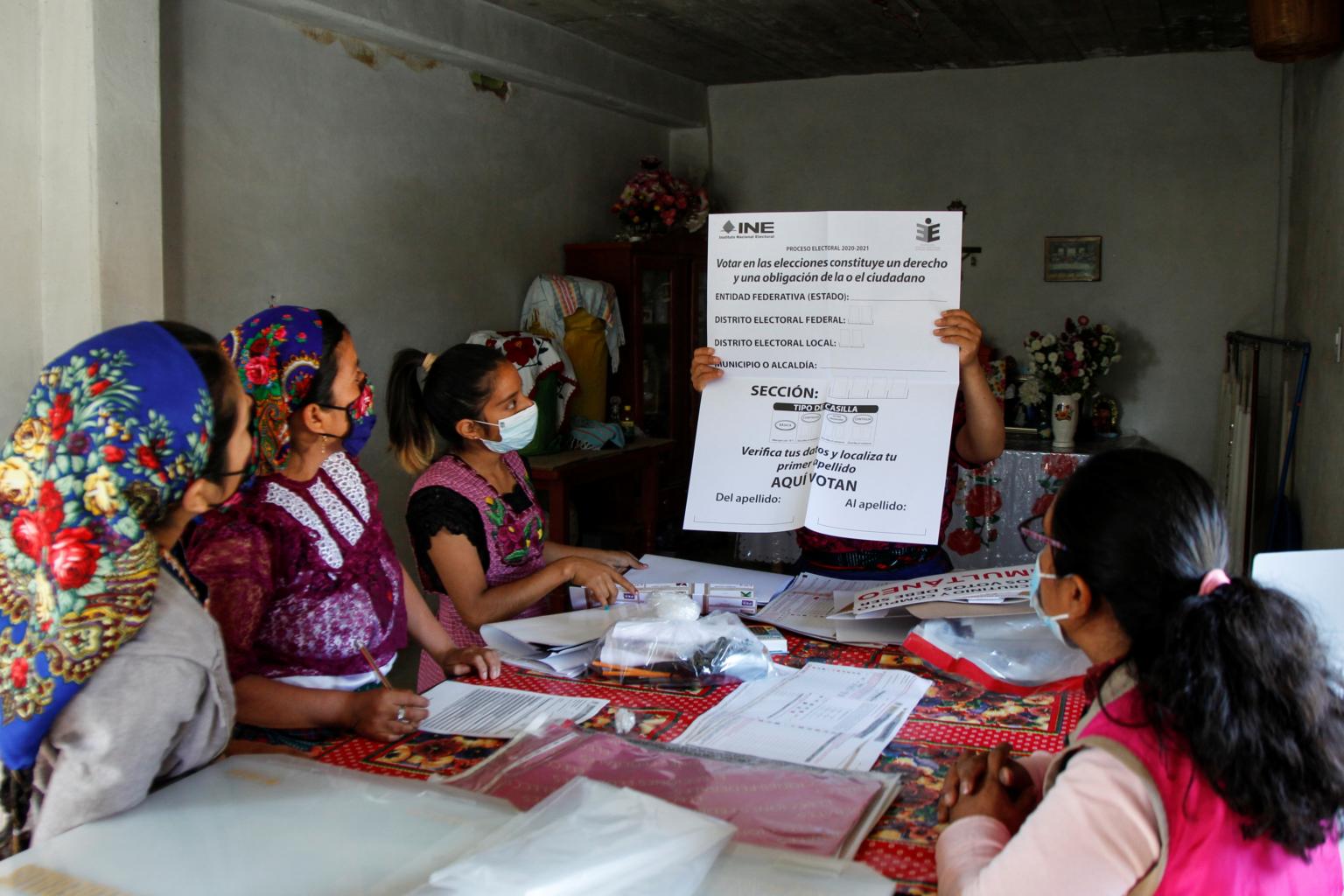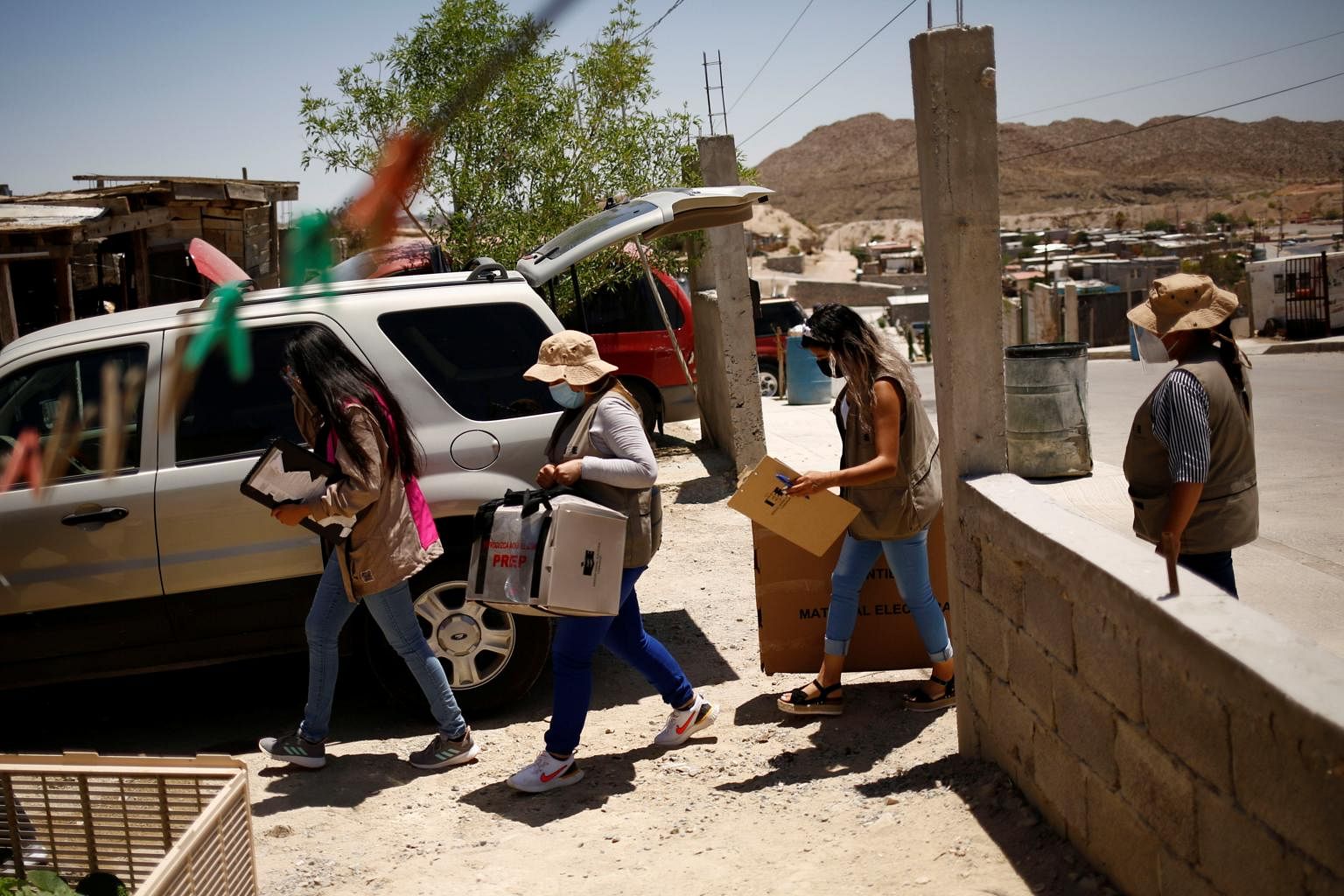Covid-19 pandemic, poverty loom over Mexican elections
Sign up now: Get ST's newsletters delivered to your inbox

Indigenous Zapotec women looking at a polling station identifier in San Bartolome Quialana, Mexico, on May 31, 2021.
PHOTO: REUTERS
Follow topic:
IZTAPALAPA, MEXICO (AFP) - The coronavirus pandemic has claimed thousands of lives in his impoverished district of Mexico City, but Mr Edgar Alonso is still determined to go out and vote in Sunday's (June 6) midterm elections.
The 48-year-old, who runs a small electronics business in a market in densely populated Iztapalapa, home to 1.8 million people, said he is keeping his faith in the electoral process.
"Covid is fate. We cannot control it," he said.
"We have to go to vote and exercise our rights as citizens," he added.
For Mr Alonso and others like him in Iztapalapa, poverty and the daily struggle to survive are what motivate them to vote for candidates they hope will make a difference.
"If we just sit here doing nothing, things will stay the same our whole lives," he said. "What we want is a real change."
Yet not everyone shares his enthusiasm in Iztapalapa, one of Mexico City's poorest neighbourhoods, where the coronavirus has killed nearly 6,600 people - more than in the whole of Israel or Ireland.
Ms Alejandra Gomez, a 62-year-old pre-school teacher, said she felt despair when one of her children fell ill with Covid-19.
She wonders how many people died because they could not find an oxygen tank.
"Why are we going to vote? To all be there like useless objects," she said as she strolled the neighbourhood's steep streets, though she did not rule out casting her ballot.
'Die of hunger'
Although pandemic lockdown measures paralysed much of Mexico's economy for months, life in Iztapalapa never stopped completely.
"People had no choice but to go out to work. They told us, 'Either we die of the pandemic or we die of hunger'," said Ms Jazmin Pille, a 35-year-old candidate for the opposition Institutional Revolutionary Party (PRI).
Accompanied by supporters, including her mother and one of her daughters, she distributed campaign fliers and shared her political proposals with anyone willing to listen.

On Sunday, Mexicans will elect 500 members of the Lower House of Congress, as well as 15 of the 32 state governors and thousands of local politicians.
Midterm elections have had an average participation of 51 per cent in Mexico, compared with 65 per cent in the presidential elections, according to official figures.
The question is whether more people will stay home this year because of the coronavirus.
'Natural disaster'
Mexico's official Covid-19 death toll of more than 227,000 is the fourth-highest in the world, but infections and fatalities have been trending lower for several months.
In May, only 13 per cent of Mexicans considered the pandemic to be the main problem facing the country, compared with 56 per cent in April 2020, according to a survey by the newspaper El Financiero.
In another poll by Consulta Mitofsky, the fear of being a victim of crime (44.7 per cent of respondents) far exceeded that of being infected with Covid-19 (17.8 per cent).
Behind this apparent lack of concern for the pandemic lies the reality of a country where half the population lives in poverty and is more worried about just surviving.
"It looks like it's a natural disaster, something where there wasn't much that could be done," said Dr Maximo Jaramillo-Molina, founder of the Institute for Inequality Studies.
Up to 9.8 million more Mexicans have fallen into poverty because of the pandemic, the National Council for the Evaluation of Social Development Policy estimated in February.
President Andres Manuel Lopez Obrador, a left-wing populist, has kept a tight grip on the government purse strings, saying it would be imprudent to increase the national debt.
Mexico's public spending rose by just 0.3 per cent in 2020 from the previous year, compared with 23.8 per cent in Brazil and 20.1 per cent in Argentina, according to the Economic Commission for Latin America and the Caribbean.
"They haven't helped us at all. They closed many businesses. Many people were left without work," said Mr Arturo Reyes, a 54-year-old butcher who plans to vote for the PRI, a harsh critic of the government's handling of the pandemic.

